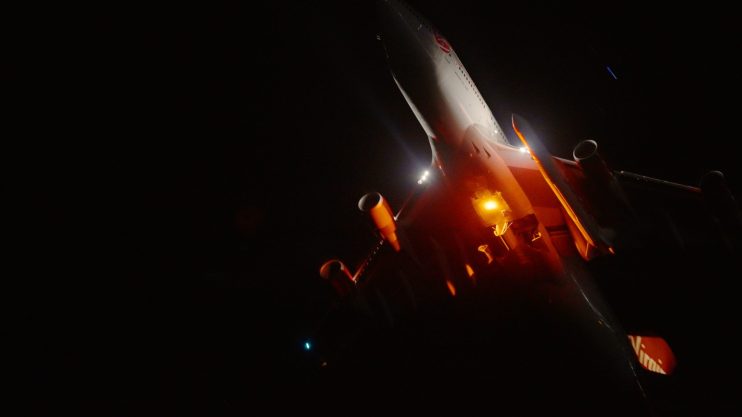UK enters space race: where to watch the launch of Virgin Orbit’s Cosmic Girl

Tonight sees the first launch of a space rocket via UK soil, with an expected launch window starting at 21:45pm tonight.
The LauncherOne rocket be attached under the wing of a modified Boeing 747 owned by Virgin Orbit which will take off from Spaceport Cornwall at Newquay Airport.
The mission, dubbed ‘Start Me Up’ mission is a collaborative effort between the United Kingdom Space Agency, Cornwall Council, the Royal Air Force and Virgin Orbit.
Launch proceedings are set to start between 21:45 and 22:45 tonight, when the Cosmic Girl 747 will take off from Spaceport Cornwall.
Between 22:54 and 23:54, the LauncherOne rocket will be released, with Cosmic Girl returning to Cornwall between midnight at 01:00.
The launch is what is known as a ‘horizontal launch’. After taking off from a runway once in flight, the LauncherOne rocket will launch from the wing, taking multiple small satellites into orbit.
The plane will then return to the Spaceport, and will able to launch more satellites in future.
Thousands of spectators are expected to gather to watch the event, and for those wanting to learn more about the launch there are educational resources online from Spaceport Cornwall.
The UK’s space sector employs an estimated 47,000 people, with more satellites built in Glasgow than anywhere outside the United States. The space industry is worth £16.4bn to the UK economy and the UK Space Agency, boasts of an annual budget of nearly £500m.
Dr. Alice Bunn president of the UKSpace told City AM that the government had contributed £11m to the project.
Bunn said that space exploration could help with more down to earth concerns, and despite the UK facing a cost of living crisis, was a justifiable expense.
She said: “Every person in the UK depends on space to live a modern life. From weather forecasts to navigation, to parcel deliver- satellites underpin every day life.
She added: “The UK space sector has built one of the most innovative and highly skilled sectors in our economy.”
Bunn said that with continued investment it could be worth £30bn by 2030.
“Our analysis shows it could create a further 30,000 in the next decade, many of which are ‘green jobs’ in areas like climate change monitoring, smart transport routing and flood prevention. These jobs are spread across the UK including Scotland, Northern Ireland, Wales, the Midlands and the South West.”
“The industry is at a critical stage of development as we are on the cusp of an industrial revolution in space. Small satellites provide essential services for every single one of us; they are the invisible enabler of our modern lives, and the UK already has a global lead in their manufacture. This trend is increasing, which is why having a launch capability in the UK is so strategically significant.”
Mark Bogget, CEO of Seraphim Space told City AM that the launch was crucial in establishing British independence in space operations.
“This launch has levelled the playing field so that its no longer the preserve of the super powers like US and China. UK wants to stake its claim on the future of the multi-decade growth opportunity presented by space,” he said.
When it comes to defence applications of a home grown launch industry, Bogget told City AM:
“Global security and food security is a key driver for the launch – the Ukraine war has put into sharp focus the need to have real-time understanding and its only large constellations that can provide the revisit rates to match the needs of defence, intelligence and security.”
David Moody, head of capability at UK Space Command stated “Now more than ever, we depend upon space to support the very life that we live and to ensure that military operations can deliver across the spectrum of national security risks.”
Bunn told City AM that the launch is focused on agile, adapting to sector satellites and it would bring a host of benefits to the British commercial and national interest.
Virgin Orbit will be broadcasting a live stream on YouTube from 9pm.
What is being launched tonight?
Several small satellites will be launched into orbit on the first UK launch g improving navigation and communications.
Several of the satellites have been built in the UK, including a research satellite from RHEA Group, which was built by Open Cosmos in Oxfordshire.
The first Welsh satellite will also be on the launch, from Cardiff-based Space Forge. It will test the process of using the unique microgravity environment of space to manufacture special materials that are much more difficult to make on Earth.
The following satellites have designed, developed or co-funded payloads on-board Virgin Orbit’s LauncherOne rocket. They include:
- IOD-3 AMBER (aka IOD-3) – built by AAC Clyde Space for Satellite Applications Catapult and Horizon Technologies, IOD-3 Amber is expected to be the first of more than 20 Amber satellites providing space-based Maritime Domain Awareness data to users.
- Prometheus-2 – Airbus Defence and Space has co-funded these two CubeSats for the UK Ministry of Defence’s (MOD) Defence Science & Technology Laboratory (Dstl), co-designing them with In-Space Missions. They will support MOD science and technology activities both in orbit and on the ground through the development of ground systems focused at Dstl’s site near Portsmouth.
- DOVER Pathfinder – RHEA Group’s first satellite, which is co-funded through the European Space Agency’s Navigation Program and built by Open Cosmos. DOVER is a SmallSat created as a pathfinder for resilient global navigation satellite systems.
- ForgeStar-0 – developed by Space Forge in Wales, the satellite is a fully returnable and reusable platform to enable in-space manufacturing. This launch will be the first for the company’s ForgeStar platform and will test future returns from space technology.
:00 tonight.